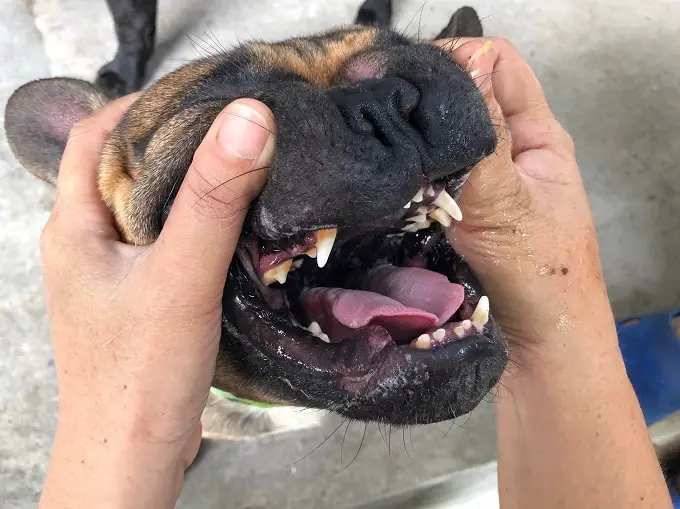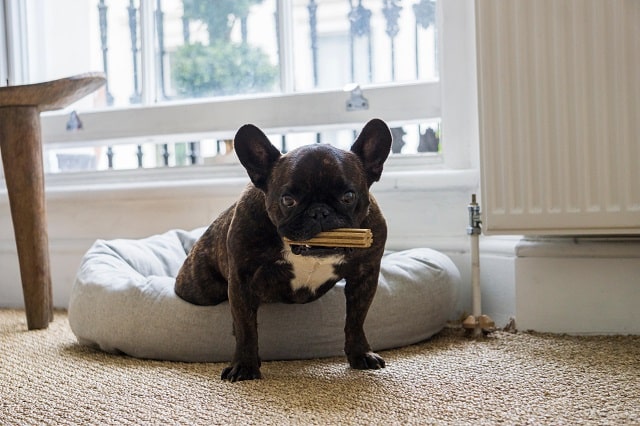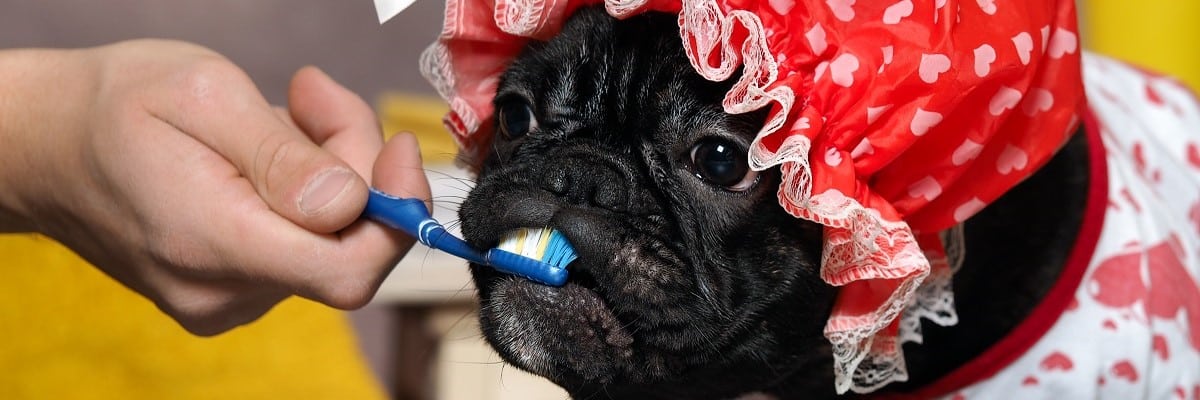My French Bulldog Has Bad Breath: There are many reasons why your Frenchies’ breath can smell, with the most common cause being a build-up of bacteria on your French Bulldogs’ teeth, called plaque. Another common condition to cause bad breath is known as halitosis.
Underpinning disorders, such as renal disease and diabetes may cause your Frenchie to have bad breath. Specific food allergies can also help in the development of halitosis.
To ascertain the source of any stinky breath, your French Bulldog should have a comprehensive medical examination.
Can Bacteria and Plaque Disease Cause Bad Breath In Dogs?
While a normal mouth contains bacteria, plaque encourages the development of bad bacteria, which generate undesirable odors and cause bad breath.
Unless the plaque is removed, it may cause irritation and inflammation of the gums, which are the first symptoms of gingivitis.
If left unchecked, gum disease can be harmful to your Frenchies welfare. While gum disease is avoidable using a daily oral hygiene routine, it is reported that approximately 80 percent of dogs develop gum disease by the age of three.
Unsurprisingly, this is a painful and unpleasant experience for your Frenchie, but it can be prevented.
Bacteria and Plaque Disease Symptoms
| Bad Breath: Bad breath isn’t as common as you would assume, and halitosis can be a sign of some dental problems. However, French Bulldog habits like eating poorly may often be the culprit. A much more severe source is when plaque and tartar accumulate on their teeth, contributing to an accumulation of bacteria that causes really bad breath. |
| Lumps or Bleeding: Gum disorder in your French Bulldog may cause pain and bleed around the muzzle. It may lead to the development of oral lumps such as epulis in the mouth of your Frenchie. If you spot a mass anywhere on your French Bulldog, make sure you take them to your nearest Veterinarian. So they conduct an urgent examination as it could be cancerous. |
| Discolouration Teeth: Teeth with yellow and brown deposits are an indication that plaque and tartar are being accumulated and should be removed. Your nearest Veterinarian will provide your Frenchie with a clean and polished treatment to remove the current build-up. This gives you a clean slate before you start brushing your Frenchies teeth at home. |
| Gingivitis: A clear sign that your Frenchies dental disease is advancing is that its tartar is developing into its gums, which creates inflammation and bleeding. Predictably, experiencing sensitive and irritated gums can be unpleasant for your Frenchie. If left unchecked, it may escalate and lead to premature dental decay. |
| Loss of Appetite: When your Frenchie has stopped eating or has trouble chewing their dry kibble, it may be an indication that they have dental disease. Which is causing them oral pain and reducing their desire to eat. Again make an appointment with your nearest Veterinarian for a clinical examination to see what is causing the problem, which may contribute to early loss of teeth. |
Preventing Bacteria and Plaque Disease
You can help protect your Frenchie from tooth and gum disease by implementing a few veterinarian suggestions. Dogs, just like yourself, may benefit from getting their teeth brushed once per day.
Cleaning their teeth and gums helps to reduce the build-up of plaque and bacteria. It’s quite easy to teach your Frenchie to get used to their teeth being brushed.
Buy your Frenchie some dog tooth-friendly chew toys to enjoy. Small, bendy chewing strips or soft rubber chewing strips and toys are good options. Do not use tough chew toys such as antlers, snouts, whitened bones, or tennis balls. If uncertain, ask your vet what toys are a healthy option.
Can Renal Disease Causes Bad Breath In Dogs?
Yes, Kidney failure happens when your Frenchies kidneys are unable to perform their job of removing toxins from their body. There are two forms of renal failure: acute and chronic.
Acute renal failure is always abrupt and develops quickly, while chronic kidney disease is much slower to present. Acute renal failure may be down to injury or poor blood flow to the kidney.
Little French Dog is a participant in the Amazon Services LLC Associates Program, an affiliate advertising program designed to provide a means for sites to earn advertising fees by advertising and linking to Amazon.com.
Symptoms Renal Disease
| Bad Breath: Your French Bulldog will start to develop bad breath that can be very obvious due to toxins produced in their bodies. |
| Urinating More Frequently: This is one of the earliest symptoms of acute and chronic renal disease. If you notice yourself taking your Frenchie out more to pee, then it might be something to keep track of. |
| Decreased Appetite: When your French Bulldog unexpectedly doesn’t want to eat and is increasingly sick, it might indicate acute kidney disease. Suppose your Frenchie appears to lose interest in their normal dog kibble and consumes only scrapes and snacks. It might signify chronic kidney failure. |
| Extreme Tiredness: If your Frenchie seems exhausted, looks sick, and doesn’t want to go anywhere. Then this may mean acute renal failure, particularly if a recent kidney injury follows it. |
| Extreme Thirst: If you find you are having to fill your French Bulldogs water bowl more often or notice your Frenchie looking for additional sources of water, it may signify chronic renal failure |
| Diarrhea and Constipation: Since the kidneys control fluids in the body, you can see complications and differences in your Frenchies bowel movements. |

Renal Disease Treatment
Management of Renal Disease relies on blood work outcomes and various procedures designed to correct particular irregularities. In certain instances, the kidneys are irreparably damaged before diagnosis, and medical care will be unsuccessful.
That being said, with early intervention and diligent care, many dogs may have a decent life for months or even years to come.
Treatment typically happens in two stages: initially flushing the kidneys, eliminating the concentrated contaminants from the blood, and then delivering medication to control the disease and slow its progress.
There are three main results from the first stage of treatment:
| The kidneys may continue to operate and will continue operating for several weeks to a few years. |
| The kidneys will continue to work throughout therapy but will fail again after treatment ends, typically within three to 14 days. |
| The Kidney function will not recover. |
The second level of therapy is to keep the kidneys working as long and as normally as possible. This is done using a combination of the following.
| Phosphate Binder | Special Diet |
| Home Fluid Therapy | Drugs To Regulate The Parathyroid Gland |
Can Diabetes Causes Bad Breath In Dogs?
Dog diabetes is induced either by a shortage of insulin in your Frenchies body or, in certain cases, through an inadequate biochemical reaction to insulin.
When your French Bulldog can not generate sufficient insulin on its own or if the insulin is not being used correctly. Then glucose will not be used correctly either.
This means that your Frenchies blood sugar levels can increase, which might contribute to negative side effects.
Like us, it’s not entirely clear why certain dogs develop diabetes. Some breeds may be even more genetically prone to the development of the disease. It’s also understood that being obese will raise your Frenchies risk of developing diabetes.
Obesity allows the cells in your French Bulldogs body to become much more insulin resistant. If your Frenchie develops diabetes, it’s more likely to occur as they start to hit their elderly years.
Symptoms Diabetes
| Bad Breath (Sweet Smell Too It) | Increase in urination |
| Unexplained weight loss | Excessive thirst |
| Appetite changes | Urinary tract infection |
| Loss of eyesight | Tiredness |

Diabetes Treatment
You should try to keep your Frenchies blood sugar levels at a normal level to control diabetes. Your Veterinarian will be able to help you with this and will recommend a comprehensive treatment plan for your Frenchie. In general, continuing care will require:
| Observing the Frenchie for changes in symptoms | Regular insulin shots |
| Regular check-ups with your vet | Food designed for diabetic dogs |

